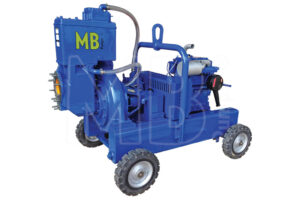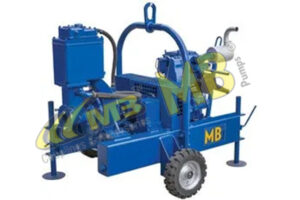In civil engineering and construction, wellpoint dewatering is an essential technique, especially when dealing with groundwater management issues. It is essential for regulating groundwater levels to ensure safe and effective excavation and building. We will explore the ins and outs of wellpoint dewatering in this post, including its fundamentals, uses, advantages, crucial factors, and ideal tools for the task. If you want any type of wellpoint dewatering pump contact MB Exports as they are the best Wellpoint Dewatering pumps & Accessories Manufacturer in India.
Wellpoint Dewatering: What Is It?
By eliminating water from saturated soils, a technique known as wellpoint dewatering facilitates safe and effective excavation and building. The procedure is frequently used in pipeline installation, tunnelling, trenching, and foundation building.
The procedure for dewatering Wellpoint:
One very useful method for lowering groundwater levels and establishing a stable, secure working environment is wellpoint dewatering. MB Exports is an expert in wellpoint dewatering systems, which are made especially to drain water out of unsteady or unstable ground situations like trenches and shaky foundations. Shallow wells with a tiny diameter that are thoughtfully placed throughout the region are used in this method. A major pipe system connects these wellpoints, and a high-efficiency water pump is attached to them.
With its outstanding performance, MB Exports wellpoint dewatering pump is especially well-suited for wellpoint applications. Water levels are significantly lowered after the wellpoints are erected using jetting tubes and the water pump quickly extracts the water. Whether the discharged water is going into the sewer system or a nearby body of water, MB Exports pump has a dependable filtration system that makes sure it is completely cleansed and safe to be moved to another desired place. This method works well for controlling groundwater levels in a variety of building and dewatering projects, and it is also economical and time-efficient.
Advantages of Dewatering Wellpoints:
Groundwater Control:
By lowering the water table and creating a stable working environment, wellpoint dewatering keeps the soil from becoming saturated. It permits building to continue in regions when groundwater levels are high.
Enhanced Stability:
Dewatering makes the soil stronger and more stable by lowering the pore water pressure within the soil. By doing this, possible cave-ins, soil failures, and associated building hazards are avoided.
Cost and Time Efficiency:
By creating a dry working space, wellpoint dewatering can shorten construction schedules. It permits continuous construction operations and does away with the requirement for large-scale excavation.
Environmental Considerations:
By keeping the extra water from being released into the surrounding areas, wellpoint dewatering reduces the impact on the environment. It also helps to clear the groundwater of impurities.
A Look Into Wellpoint Dewatering:
Site Investigation:
Prior to putting wellpoint dewatering into practice, a complete grasp of the hydrogeology of the site is essential. It is necessary to evaluate elements including water quality, groundwater flow, and soil type.
System Design:
The wellpoint system’s efficiency depends on its proper architecture and design. A few things to think about include the header pipe arrangement, wellpoint spacing, and the necessary pumping capacity.
Regulations and Permits:
Permits may be needed from local authorities for projects involving wellpoint dewatering. It is necessary to guarantee adherence to environmental standards and discharge restrictions.
Observation and upkeep:
To guarantee the dewatering system’s efficacy, regular monitoring of its components, performance, and water levels is required. For the system to last a long period, proper maintenance and prompt repairs are essential.
In summary:Wellpoint dewatering is a crucial method in civil engineering and construction that effectively addresses groundwater management issues. By using shallow wells and vacuum-assisted pumps, this technique lowers the water table and creates a controlled environment for building and excavation activities. Groundwater control, enhanced stability, cost and time efficiency, and environmental considerations are just a few advantages of wellpoint dewatering. Nonetheless, several crucial factors need to be taken into account, including carrying out a comprehensive site study, guaranteeing appropriate system design, securing licences and adhering to laws, and putting in place routine monitoring and maintenance. Wellpoint dewatering is a dependable and effective method for controlling groundwater levels in a variety of building and dewatering projects when certain guidelines and considerations are followed. MB Exports is the top WellPoint Dewatering pumps manufacturer exporter in India.
Read more about the Construction Dewatering Methods, Pump Tips and Precautions.



